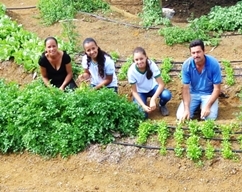Partnership for Social Technology
Integrated and Sustainable Agro-Ecological Production already benefits 75 families creating work opportunities and income generation
28 de August de 2013
Integrated and Sustainable Agro-Ecological Production already benefits 75 families creating work opportunities and income generation
28 de August de 2013

In September 2011, representatives from the Banco do Brasil Foundation (FBB) traveled to the Bahia Southern Lowlands to learn more about the strategies of the Bahia Southern Lowlands Environmental Protection Area Mosaic Program for Development and Growth Integrated with Sustainability (PDCIS), supported by the Odebrecht Foundation in partnership with national and international public and private institutions.
This interaction generated an agreement with the educational units associated with PDCIS for the implementation of the initiative PAIS – Integrated and Sustainable Agro-Ecological Production. Disseminated and replicated by FBB, this social technology promotes sustainable agriculture and healthy foods for rural families, in addition to creating work and income generation opportunities.
Nearly two years later, 75 PAIS units have been installed and 105 are currently being installed on the properties of the young producers who study at the Family Homes – the Presidente Tancredo Neves Rural Family Home (CFR-PTN), Igrapiúna Rural Home (CFR-I), Agroforest Home (Cfaf), and the Youth Home. “I began planting the crops in a planned fashion and I’m also selling produce – cilantro, parsley and mint – at local establishments,” said Deian de Andrade, age 18, resident of the community of Moenda in Presidente Tancredo Neves.
As soon as they received kits to set up the structure for PAIS – which consisted of a circular garden, agro-ecological yard, chicken coop in the middle and drip irrigation –, the technical staff of Cfaf, CFR-I and the Youth House participated in the training sessions held at CFR-PTN, the first to start the work applying the technology.
Benefits for the Communities
Encouraged to participate in the project, Wagner Conceição, age 20, a graduate of Cfaf, is guaranteeing R$ 550 per month through the sale of produce alone at outdoor fairs and through public policies, such as the Food Acquisition Program (PAA). “In addition to complementing the family’s income, I know that I am supplying healthy foods to the final consumer,” said the resident of the community of Lagoa Santa, in Ituberá.
For his next harvest, Quésia Santos, age 17, a second-year student at CFR-I and resident of Piraí do Norte, will also sell her products via PAA. “Through the municipality’s Department of Agriculture, we will offer foods to the schools and contribute toward the health of many children,” she said. “The results are visible and this motivates me to increase production.”
The Youth House supported the installation of the PAIS units at the homes of graduates from the Youth House State School (CECJ). One of them is Jhonatan dos Santos, age 19, from the second-year group of the technical course in Agro-Ecology. “Because I didn’t have any cost to adopt this project, I will be able to invest the profit in the next crops,” said Santos.
Gláucio Gonçalves, an Agronomic Engineer and professor at CECJ, pointed out three important aspects of PAIS for family farmers: “It guarantees high quality food, helps improve monthly income and promotes practices that are in harmony with the environment, since the entire management of the project is based on the rational use of natural resources, such as water and soil.”
Do you wish to be
a partner in our projects, make
a donation or hire our technical consulting?
Send a message
right now!